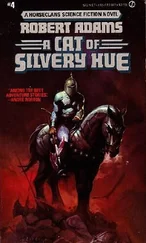When he regained his senses, he was lying on the ground and looking up at an ill-matched pair of warriors—one thin and wiry, the other big and beefy, Mainahkos and Ahreekos by name. When he realized that his captors were bandits, not agents of the Church, he admitted to his recent outlawry and ended by being offered a place of command in the sizable force led by the two warlords. Stehrgiahnos had accepted.
Over the years, Stehrgiahnos had done what little he could to influence his commanders as to the merits of treating the inhabitants of places they did not have to take by storm and force with less than their inbred savagery. This did not, however, apply to Church-owned communities; on the evidences of what horror had taken place at a rural school for the training of priests, its farms and walled town, the renegade nobleman had been afforded evident respect and a generous degree of comradery by Mainahkos and Ahreekos, certain from the bloody signs that he could be naught save one of them, a true brother of the soul if not of birth or background.
His military training and vast experience had proved of inestimable value to the two warlords; the strict discipline that he and some few other once-noble officers and veteran sergeants had enacted and very harshly enforced had rendered the heterogeneous mob with which they had begun into a relatively more reliable and dependable force of troops.
Stehrgiahnos’ strong, compact, wide-ranging corps of dedicated sadists had marched from place to place, deliberately seeking out only Church properties, towns and cities, storming them without offering to treat, and visiting upon the miserable survivors of the stormings the ultimate in depraved atrocities. Then, after all of value or interest had been plundered, they invariably burned the places to the ground, with such few of their human victims as by then still lived left helpless to roast alive.
So many Church places fell to Stehrgiahnos’ corps that all of the as yet untouched places felt constrained to desert their smaller, less defensible habitations and join together in a few larger and stronger if less comfortable spots, not beginning to return to their holdings until the authority of the Council had begun to make its steel-clad presence felt throughout the former kingdom.
But when he had marched against the city that once had been his, the broken komees had been keenly disappointed, finding both it, his natal hold and the ducal city and hold to have fallen to some other band at some earlier time and become but sacked, smoke-blackened, ghost-haunted ruins.
When he had heard the entirety of the sorry tale from the lips of his newest slave, Thoheeks Grahvos had sat in silence, staring hard at Stehrgiahnos for a long while. Finally speaking with a gruff gentleness, he had said, “There’s an ewer over there on that commode, along with a brace of goblets, Stehrgiahnos. Pour for both of us, then take the chair yonder. I had thought that I had ferreted out everything about you and your past; I was wrong and I freely admit to the fact. You’ve had a hard, bitter time of it, haven’t you, lad?
“A man of your military antecedents would be of some great value to our army, but of course that’s out of the question so long as our Grand Strahteegos and Thoheeks Portos remain fixtures of it. Our old Pahvlos was bitterly disappointed that you weren’t at the least hung up on a cross; Portos would’ve had you crucified with an iron pot of starving mice strapped to your belly.
“However my feelings toward you have altered now, Stehrgiahnos, little else of what I earlier told you has; some of it cannot, like it or not. You still are a slave; I cannot free you, that was part of my purchase agreement, you see, nor can I sell you, though I may give you to anyone I wish if no money or goods or services are bartered for you. I’ll not be having you branded, but there will be a mark cut into your flesh; however, it will be so shaped and placed that it will pass as an old wound scar to the scrutiny of any who don’t know exactly what to look for and where to look for it.
“I’ll still be using you as my clandestine agent in certain matters for me and, through me, for Council. Between such assignments, I think you’ll be a body servant and bodyguard; in such a capacity you’ll not only be able to dress like the gentleborn man that you are, you’ll also be able—indeed, expected—to go armed. Anent that, before you leave this room, choose a sword that suits you from that rack over there; the dirks and daggers are in the drawer above. When you’ve regained your energy and strength, I’ll expect you to start exercising regularly with the palace guards, both ahorse and afoot, with and without armor. As I’m certain you know, you won’t be the first slave bodyguard; indeed, some noblemen will have no other kind.”
The Stehrgiahnos who responded to his master’s summons on a certain blustery winter day looked the part of a gentleman-retainer to the hilt. His ease of movement warned knowledgeable observers that he had worn a sword for many a year and presumably, therefore, could be expected to know well its use.
Stitched between the layers of his suede-trimmed, half-sleeved, satin-brocade gambeson was a shirt of fine, light, very expensive mail, and his soft-looking felt cap incorporated a steel skullcap. Like these items, none of the other bits and pieces of protective armor scattered about his body in vulnerable or sensitive spots were openly displayed, nor were the highly visible sword and short dirk the only weapons on his person, or even the most incipiently deadly ones.
He had burnished his service bracelet until it gleamed like the gold-and-garnet finger ring that had been presented to him after the first occasion on which he had saved his master’s life through the expedient of forcing a would-be assassin to take some inches of blued steel to heart. The other, more massive, ring was of chiseled silver and set with a piece of dark-blue kiahnos-stone; that one he had won dicing in the barracks of the Council Guards.
Upon hearing the words of his master, Stehrgiahnos had frowned briefly, stared into his goblet of mulled wine, then brightened and declared, “A begging monk, my lord! They’re under the control of no one, really, not their order, not any kooreeohsee, yet any Church facility will welcome one, for right many commoners consider such to be far more holy than any other stripe of churchmen. They’re allowed to wander about, poke into just about anything, and other Church folk behave and converse as if the begging monks were inanimate objects or livestock.”
Thoheeks Grahvos pursed his lips and nodded. “It sounds good, yes. But could you carry it off? Remember, it could be your very life if you’re found out, my boy.”
A grim smile lingered momentarily on Stehrgianos’ scar-seamed face. “I’ve done such before, my lord, back when I was scouting out ahead of my corps of bandits, determining the richest, least-protected places to attack. The first few times, I went in with and under the tutelage of a real begging monk who was also a bandit, but after he was killed in combat, I did it alone for some time with never a bit of trouble.
“You see, my lord, all that is required is a fluency in Pahlahyos Ehleeneekos—the ancient tongue of our forefathers, which I happen to own, since my own sire was something of a scholar—appalling personal hygiene, a fair knowledge of Church ritual and the ability to give the impression that one is more or less mad.
“The man from whom I learned all of this was indeed mad, mad as mad could be. He was like three entirely different men inhabiting but a single body. The begging monk, Ahthelfos Djooleeos, was a meek, gentle toper who was never quite sober. There was also a noble priest of exquisite manners and gentility, a most devout and caring man, but he was never much seen, and then only briefly; he was called Pahtir Leeros. Then there was Rawnos the Blood-drinker, a true berserker in battle, murderer, rapist, sadist, arsonist; he was vicious, grasping, a bully and braggart, a user of hemp paste and leaves, callous and greedy to unbelievable limits; he would never have been tolerated in any aggregation of men other than the bandit army. But there was many a madman and sociopath in that army.”
Читать дальше












